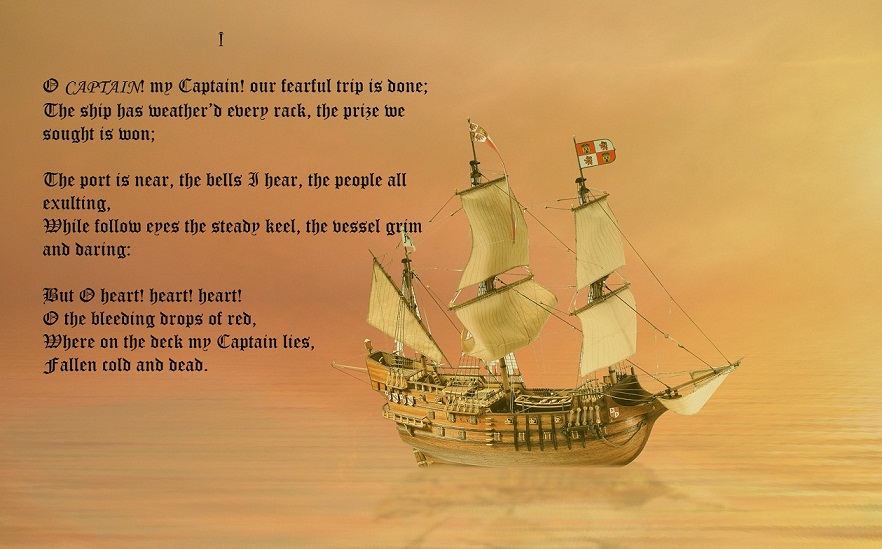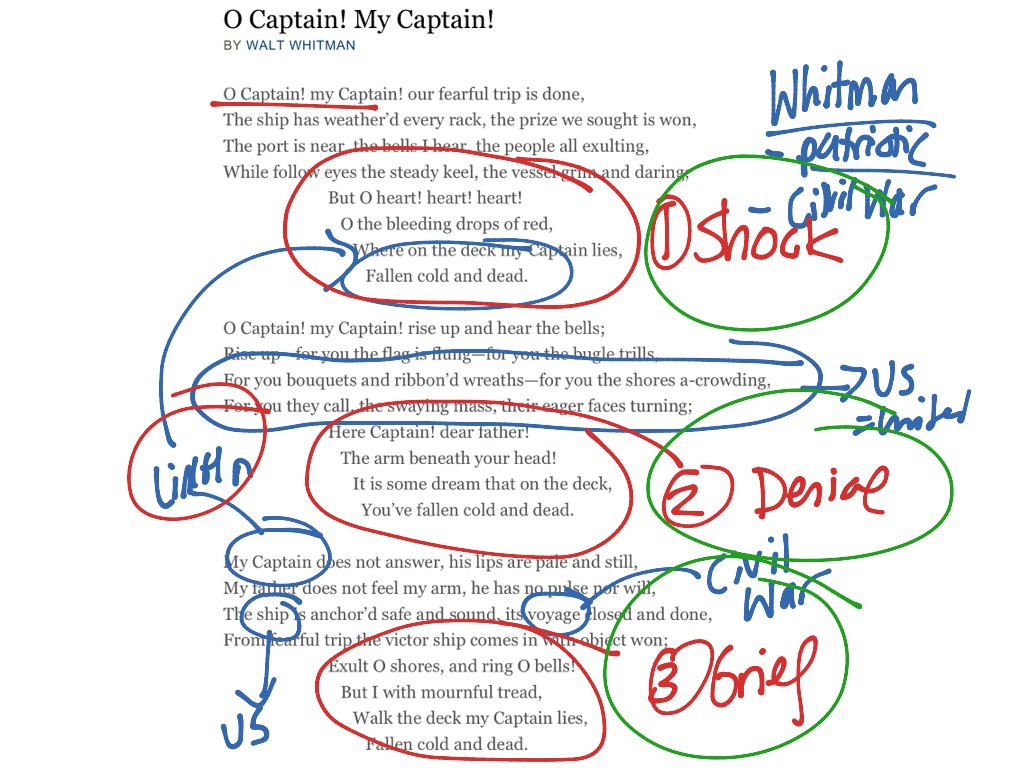In the world of American poetry, few works evoke as much emotion and resonance as "O Captain! My Captain!" by Walt Whitman. This iconic poem was penned following the assassination of President Abraham Lincoln and serves as a powerful elegy for a nation in mourning. Through vivid imagery, profound symbolism, and emotional depth, Whitman captures the collective grief of a country grappling with the loss of its leader. In this detailed analysis, we will delve into the themes, structure, and historical significance of this timeless poem, exploring its lasting impact on American literature and culture.
The opening lines of "O Captain! My Captain!" set the stage for an emotional journey that resonates with readers to this day. By directly addressing the "Captain," Whitman establishes a deeply personal connection, evoking a sense of intimacy and urgency. As we explore the poem further, we will analyze the various elements that contribute to its power, including its historical context and the literary techniques employed by Whitman. Through this exploration, readers will gain a deeper understanding of why this poem remains a cornerstone of American literary heritage.
In the sections that follow, we will examine the intricate structure of the poem, analyze its central themes, and reflect on its historical significance. By the end of this article, readers will appreciate the rich layers of meaning woven throughout Whitman's work and its relevance in contemporary discussions of leadership, loss, and national identity.
Read also:Exploring Kim Fields Journey Career Influence And Net Worth In 2023
Contents Overview
- Biographical Context of Walt Whitman
- Overview of "O Captain! My Captain!"
- Themes Explored in the Poem
- Literary Devices Used by Whitman
- Historical Context and Significance
- Critical Analysis of the Poem
- Conclusion
- References
Biographical Context of Walt Whitman
Walt Whitman, born on May 31, 1819, in West Hills, New York, is celebrated as one of the most influential figures in American literature. His work broke away from traditional poetic forms, creating a new voice that celebrated both the individual and the collective spirit of America. Whitman was deeply committed to the ideals of democracy and equality, and his experiences during the Civil War profoundly influenced his writing. His magnum opus, "Leaves of Grass," first published in 1855, underwent numerous revisions throughout his lifetime, reflecting his evolving perspectives on nationalism, identity, and the human experience.
The assassination of Abraham Lincoln in 1865 left a lasting impact on Whitman, inspiring him to write "O Captain! My Captain!" as an expression of his personal grief and the collective sorrow of the American people. Through this poem, Whitman not only honored Lincoln's legacy but also captured the emotional turmoil of a nation in transition.
| Personal Information | Details |
|---|---|
| Name | Walt Whitman |
| Date of Birth | May 31, 1819 |
| Date of Death | March 26, 1892 |
| Notable Works | Leaves of Grass, Drum-Taps, Specimen Days |
| Occupation | Poet, Essayist, Journalist |
Overview of "O Captain! My Captain!"
"O Captain! My Captain!" is structured into three stanzas, each following a consistent rhyme scheme. The poem's tone oscillates between mourning and celebration, reflecting the complex emotions felt by Whitman and the nation in the aftermath of Lincoln's assassination. The poem opens with a call to the "Captain," a metaphor for Lincoln, who has steered the nation through the perilous waters of the Civil War.
The first stanza captures the initial euphoria of victory, with vivid imagery of the ship's triumphant return after a grueling journey. However, this joy is quickly overshadowed by the tragic revelation in the second stanza, where the Captain's death is unveiled. The final stanza serves as a poignant lament, emphasizing the profound sense of loss and the enduring need for remembrance. Through this structure, Whitman masterfully conveys the emotional duality of triumph and sorrow.
Themes Explored in the Poem
Loss and Grief
At the heart of "O Captain! My Captain!" lies the theme of loss and grief, capturing the profound sorrow experienced by a nation mourning its leader. Whitman skillfully portrays the duality of celebrating a hard-won victory while confronting the devastating reality of death. This theme resonates universally, as it mirrors the human experience of mourning loved ones and grappling with the impermanence of life.
Leadership and Sacrifice
Another pivotal theme is the concept of leadership and sacrifice. Lincoln is depicted as a heroic figure who navigated the nation through its darkest hours, embodying the qualities of resilience and dedication. Whitman's portrayal of the Captain underscores the importance of effective leadership, especially during times of crisis, and the sacrifices leaders make for the greater good of their people.
Read also:Alain Delon The Cinematic Legends Net Worth And Legacy
Literary Devices Used by Whitman
Whitman employs a variety of literary devices to heighten the emotional impact of the poem. Among the most notable are:
- Metaphor: The use of the "Captain" as a metaphor for Lincoln highlights his role as a guiding force and leader.
- Imagery: Rich and evocative imagery is used to paint a vivid picture of the ship's journey, contrasting the feelings of triumph and sorrow.
- Repetition: The repeated invocation of "O Captain!" amplifies the speaker's emotional plea and underscores the profound sense of loss.
Historical Context and Significance
Written shortly after the assassination of Abraham Lincoln on April 14, 1865, "O Captain! My Captain!" captures a pivotal moment in American history. Lincoln's death symbolized the loss of a unifying figure who had guided the nation through the turmoil of the Civil War. Whitman's poem reflects the national sentiment of grief and betrayal, resonating with the collective emotions of a people still reeling from the war's aftermath.
Moreover, the poem addresses broader themes of American identity and the challenges faced by the nation during this tumultuous period. Whitman's ability to encapsulate these emotions in his poetry has cemented "O Captain! My Captain!" as a significant work in American literature, offering enduring insights into the complexities of leadership and national unity.
Critical Analysis of the Poem
Critics have long praised "O Captain! My Captain!" for its emotional depth and Whitman's innovative style. Scholars often highlight the poem's exploration of the tension between celebration and mourning, suggesting that Whitman captures the intricate interplay of human emotions in the face of loss. The metaphor of the ship can be interpreted as a reflection of the nation itself, navigating through turbulent waters under the guidance of a capable leader.
Some critics argue that the poem serves as a commentary on the fragility of democracy and the critical role of leadership in maintaining national unity. Through its enduring relevance, "O Captain! My Captain!" invites readers to reflect on the sacrifices inherent in public service and the importance of strong leadership in shaping a nation's future.
Conclusion
In summary, "O Captain! My Captain!" stands as a testament to Walt Whitman's unparalleled skill in capturing the complexities of human emotion. By exploring themes such as loss, grief, leadership, and sacrifice, Whitman crafts a poignant elegy that continues to resonate with readers today. The historical context of the poem adds depth to its meaning, underscoring the significance of Lincoln's legacy in shaping the American identity.
As we reflect on Whitman's work, it is crucial to recognize the transformative power of poetry in articulating the human experience. "O Captain! My Captain!" invites readers to engage with their emotions and consider the profound impact of leadership on society. We encourage you to share your thoughts on this analysis in the comments section below and explore further insights into Whitman's contributions to American literature.
References
- Whitman, Walt. "O Captain! My Captain!" Leaves of Grass.
- Folsom, Ed, and Kenneth M. Price. "Walt Whitman: The Song of Himself." University of Iowa Press, 2006.
- Levine, Stuart. "Walt Whitman: A Biography." New York: 1990.
- Hoffman, Daniel. "Whitman." New York: 1970.


